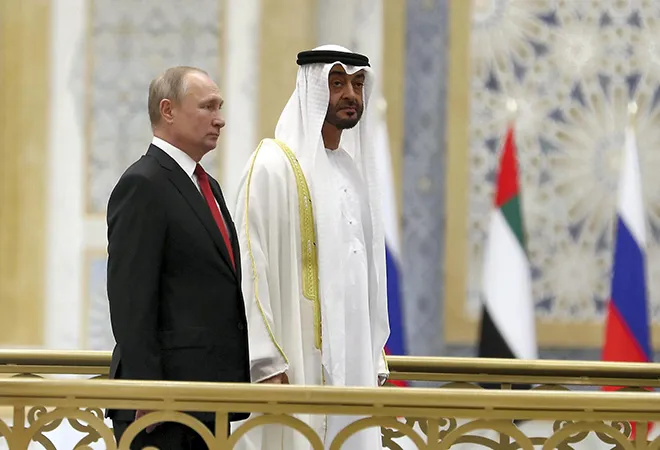
This brief is a part of
The Ukraine Crisis: Cause and Course of the Conflict.
Introduction
With the recent United Nations General Assembly (UNGA) body witnessing an overwhelming vote against Russia’s actions in Ukraine, it is imperative to note that the UAE, a strong ally of both Russia and the United States (US), voted against Russia, changing its previous stance where it abstained from voting on the UN Security Council (UNSC). This change in stance brings to light the UAE’s delicate situation in handling global crises, and how the nation has been compelled to engage with more than just its region. The remainder of the article thus, provides an understanding of the UAE’s delicate position and its strategic calculations regarding Russia’s aggressions in Ukraine.
The UAE’s engagement with the global powers: A changing calculus
While the UAE boasts of a modest land mass relative to its neighbours such as Saudi Arabia, Iraq, Iran, and other Middle Eastern nations, it has
achieved power disproportionate to its size due to its oil wealth and position as a tourist and financial hub. Especially, since the death of its founder
Sheikh Zayed, the nation has worked hard to project its strength over the Middle East region, engaging with various actors and conflicts as well as with global powers such the US and Russia.
Historically, the UAE has been a
staunch ally of the US, which provided the nation with security assurances in exchange for oil. This has led to various benefits for both nations, with the UAE even establishing
official relations with Israel in 2020, a hitherto unthought of alliance.
While the UAE boasts of a modest land mass relative to its neighbours such as Saudi Arabia, Iraq, Iran, and other Middle Eastern nations, it has achieved power disproportionate to its size due to its oil wealth and position as a tourist and financial hub.
Over the last decade, since President Obama’s tenure, the US has slowly worked to
extricate itself from the Middle East, limiting itself to an arms seller rather than just an oil buyer and a security provider. In this backdrop, the UAE had to re-strategise its foreign policy calculus. Largely, it did this by balancing the US’ withdrawal with increasing trade and bilateral relations with other nations like Russia and
China, nations that rivalled the US’ interests.
The UAE-Russia relations
Thus, specifically in the case of Russia, the UAE has seen trade ties burgeon significantly amounting to about
US $4 billion making it one of Russia’s largest trade partners in the West Asia/ Middle East region. In recent years, the UAE has also begun to cooperate with Russia in some of the Middle Eastern conflicts. For instance, after years of opposing the Syrian President, Bashar al Assad, the UAE has now gone back to normalising relations with the nation and
converged on many of Russia’s viewpoints such as its
objection to arming opposition groups as well as keeping Assad in power. Reportedly, much of this occurred in response to the US’ withdrawal from the region, necessitating an enhanced engagement with Russia.
Similarly, the UAE has also met eye to eye with Russia on war-torn
Libya, where it supports the military general Khalifa Haftar and Saif Gaddafi as opposed to the US, which supports other powerbrokers in the nation. A 2020 US Pentagon report even
noted that the UAE was most likely funding the Russian paramilitary organisation, the Wagner Group, in Libya. The Wagner group has achieved global fame for its
alleged efforts to assassinate the Ukrainian President Zeylinsky in the current Ukrainian crisis.
After years of opposing the Syrian President, Bashar al Assad, the UAE has now gone back to normalising relations with the nation and converged on many of Russia’s viewpoints such as its objection to arming opposition groups as well as keeping Assad in power.
Moreover, apart from just cooperating politically, the Emirati Sheikdom also has a strong financial stake in cooperating with Russia. The UAE is now home to a large number of
Russian tourists, a major requirement in a post COVID economy—as well as several
Russian investments due to its easy financial laws. Undoubtedly, the
surge in oil prices due to the invasion of Ukraine has also worked positively for the Emirati nation in its bid to shore up its finances post the COVID-19 crisis.
Game of votes: UNSC vs UNGA
Given all these above factors, it made sense that the UAE abstained from voting in the UNSC resolution that condemned Russia. In addition, several immediate factors also contributed to this decision, the majority being the UAE’s aims to get
Russian support in labelling the Houthis of Yemen as a terrorist organisation—a much desired outcome by the UAE after the Houthis fired rockets into the Arab nation. After UAE’s abstention in the UNSC vote, Russia
changed its explicit stance of not labelling the Houthis as a terrorist group. According to one UAE spokesperson, the UAE also abstained since the conclusion was
foregone given Russia’s veto power in the Security Council.
However, shortly after, in the UN General Assembly vote, the UAE voted against Russia, thus changing its stance, alongside many other Middle Eastern nations. Several factors may explain this shift.
After UAE’s abstention in the UNSC vote, Russia changed its explicit stance of not labelling the Houthis as a terrorist group.
First, the UNGA is not as
authoritative a body as the UNSC and thus, the UAE may have thought it fit to vote in a non-consequential forum. Second, the US expended
considerable efforts to convince the UAE and other Arab nations to ensure that the outcome of the UNGA vote was overwhelming against Russia. Third, according to some analysts, the UAE may have also
reacted to global media coverage of its abstention in the UNSC vote leading it to change its decision. According to
Cinzia Bianco, this shift also demonstrated the UAE’s (and other Arab nations’) efforts to hedge between the US and Russia.
Conclusion
In many ways, the UAE has realised that its ambitions to become a regional power aided by its immense financial (and recent defense) resources are also bringing new challenges. The Ukraine crisis which some thought would never materialise has tested many nations’ capacity to engage with different actors including large nations like India as well. The UAE is no exception to this given the US’ and the West all-in approach to opposing Russia (barring military steps).
Against a background of a global economic slump due to the COVID-19 pandemic, the UAE’s major short-term goal is to rejuvenate its economy and ensure financial independence, therefore, leading to it taking steps to avoid angering Russia. Its long-term goal of standing out as a regional power, however, has laid bare some challenges when it comes to the West versus Russia in the current crisis. These multiple factors have played a role in dictating the UAE’s votes in the United Nations.
The views expressed above belong to the author(s). ORF research and analyses now available on Telegram! Click here to access our curated content — blogs, longforms and interviews.



 This brief is a part of
This brief is a part of  PREV
PREV


